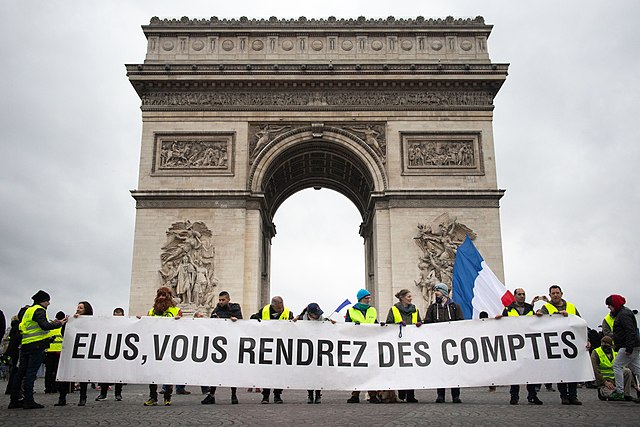Yellow vest protests continue
March 27, 2019 | Expert Insights

France's "yellow vests" are expected to stage further anti-government protests on March 23 despite the authorities vowing a "zero tolerance" approach after major riots in Paris last week.
Background
The yellow vests movement or yellow jackets movement is a populist, grassroots political movement for economic justice that began in France in November 2018. After an online petition posted in May had attracted nearly a million signatures, mass demonstrations began on 17 November.
The movement is motivated by rising fuel prices, high cost of living, and claims that a disproportionate burden of the government's tax reforms was falling on the working and middle classes, especially in rural and peri-urban areas.
The protesters have called for lower fuel taxes, reintroduction of the solidarity tax on wealth, a minimum wage increase, the implementation of Citizens' initiative referendums and Emmanuel Macron's resignation as President of France and his government. The movement spans the political spectrum. According to one poll, few of those protesting had voted for Macron in the 2017 French presidential election, and many had either not voted, or had voted for far-right or far-left candidates
The protests have been going on for 17 consecutive weeks, starting in mid-November 2018.
Analysis
Paris police have banned the protesters from a large area in the west of the city, including the famed Champs-Elysees avenue, scene of last week's rampage by hundreds of anarchists, as well as the presidential palace and National Assembly.
Similar bans have been announced in the centres of Toulouse, Bordeaux, Dijon, Rennes and the southern city of Nice where Chinese President Xi Jinping is to meet his French counterpart Emmanuel Macron this weekend.
Mr Macron is under pressure to avoid a repeat of last week's sacking of the Champs-Elysees, where over 100 shops were damaged, looted or set alight during seven hours of rioting by mainly masked, black-clad protesters.
The government has announced plans to redeploy soldiers from its Sentinelle anti-terror force on Saturday to guard public buildings to free up the police to tackle the radicals. The announcement has drawn howls of protest from the opposition who have accused the government of playing with fire.
On social media, "yellow vest" leaders, who have been accused of whipping up the violence with incendiary rhetoric, urged caution In a YouTube post, truck driver Eric Drouet called on protesters not to try to return to the Champs-Elysees.
"It's a very very bad idea. You know what image they're trying to create of us," he said, predicting a "quiet Saturday". Mr Macron's government drew fierce criticism over its handling of last week's protests.
The police appeared to hang back in the face of sustained attacks, after being accused of using excessive force during several previous such protests. The Paris police chief was fired over the violence.
On March 22, clean-up operations continued on the Champs-Elysees. Shattered panes were being removed from a Swarovski crystal store, which was ransacked after neglecting to board up its windows. Work was also being carried out on six news kiosks that were torched, leaving several newspaper vendors out of work.
The protests began in rural France on Nov 17 over fuel tax increases and quickly ballooned into a full-scale anti-government rebellion that two months of public policy debates have failed to defuse.
In recent weeks, the protesters' numbers have dwindled, falling from 282,000 nationwide on the first Saturday to just 32,000 last week, according to official estimates.
Those still on the streets appear more determined than ever to make their presence felt, however.
The violence has cost the protesters, who want higher taxes on the rich and a greater say for ordinary people in the running of the country, public support, according to a poll published on Wednesday (March 20).
Some 53 per cent of respondents said they either supported or felt a degree of sympathy towards the movement, down eight points in a week.
Assessment
Our assessment is that the yellow vest movement is appearing to lose public support due to excessive rioting and looting incidents by yellow vest protestors over the past two months. We believe that President Macron is carefully negotiating the high-risk dialogue with the protestors by patiently waiting for it to implode as opposed to crushing it with police force.
Image courtesy: Olivier Ortelpa from Paris, France (https://commons.wikimedia.org/wiki/File:Paris,_Gilets_Jaunes_-_Acte_IX_(45808616985).jpg), „Paris, Gilets Jaunes - Acte IX (45808616985)“, https://creativecommons.org/licenses/by/2.0/legalcode








Comments